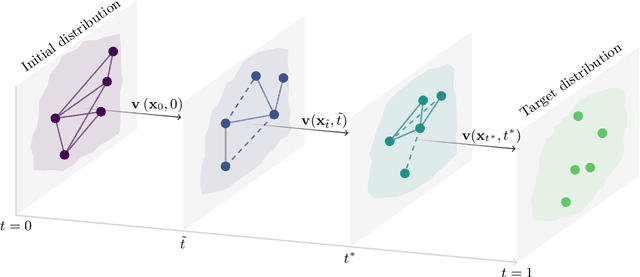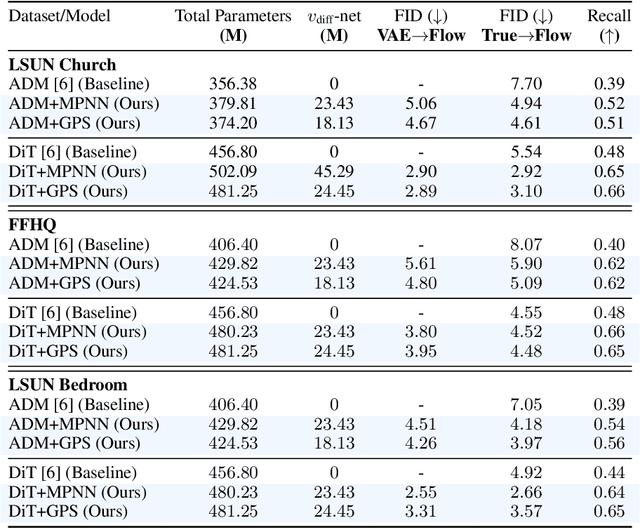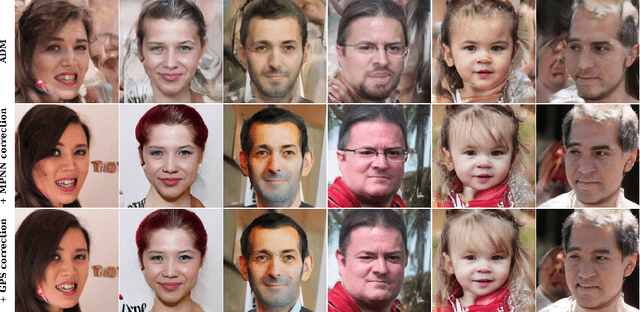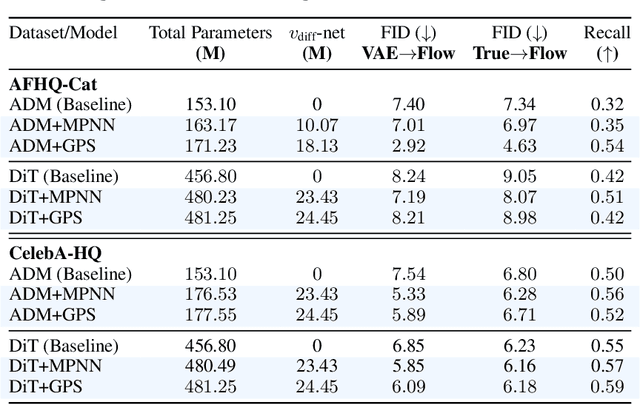Md Shahriar Rahim Siddiqui
Graph Flow Matching: Enhancing Image Generation with Neighbor-Aware Flow Fields
May 30, 2025



Abstract:Flow matching casts sample generation as learning a continuous-time velocity field that transports noise to data. Existing flow matching networks typically predict each point's velocity independently, considering only its location and time along its flow trajectory, and ignoring neighboring points. However, this pointwise approach may overlook correlations between points along the generation trajectory that could enhance velocity predictions, thereby improving downstream generation quality. To address this, we propose Graph Flow Matching (GFM), a lightweight enhancement that decomposes the learned velocity into a reaction term -- any standard flow matching network -- and a diffusion term that aggregates neighbor information via a graph neural module. This reaction-diffusion formulation retains the scalability of deep flow models while enriching velocity predictions with local context, all at minimal additional computational cost. Operating in the latent space of a pretrained variational autoencoder, GFM consistently improves Fr\'echet Inception Distance (FID) and recall across five image generation benchmarks (LSUN Church, LSUN Bedroom, FFHQ, AFHQ-Cat, and CelebA-HQ at $256\times256$), demonstrating its effectiveness as a modular enhancement to existing flow matching architectures.
Learning Regularization for Graph Inverse Problems
Aug 19, 2024Abstract:In recent years, Graph Neural Networks (GNNs) have been utilized for various applications ranging from drug discovery to network design and social networks. In many applications, it is impossible to observe some properties of the graph directly; instead, noisy and indirect measurements of these properties are available. These scenarios are coined as Graph Inverse Problems (GRIP). In this work, we introduce a framework leveraging GNNs to solve GRIPs. The framework is based on a combination of likelihood and prior terms, which are used to find a solution that fits the data while adhering to learned prior information. Specifically, we propose to combine recent deep learning techniques that were developed for inverse problems, together with GNN architectures, to formulate and solve GRIP. We study our approach on a number of representative problems that demonstrate the effectiveness of the framework.
Deep Optimal Experimental Design for Parameter Estimation Problems
Jun 20, 2024Abstract:Optimal experimental design is a well studied field in applied science and engineering. Techniques for estimating such a design are commonly used within the framework of parameter estimation. Nonetheless, in recent years parameter estimation techniques are changing rapidly with the introduction of deep learning techniques to replace traditional estimation methods. This in turn requires the adaptation of optimal experimental design that is associated with these new techniques. In this paper we investigate a new experimental design methodology that uses deep learning. We show that the training of a network as a Likelihood Free Estimator can be used to significantly simplify the design process and circumvent the need for the computationally expensive bi-level optimization problem that is inherent in optimal experimental design for non-linear systems. Furthermore, deep design improves the quality of the recovery process for parameter estimation problems. As proof of concept we apply our methodology to two different systems of Ordinary Differential Equations.
 Add to Chrome
Add to Chrome Add to Firefox
Add to Firefox Add to Edge
Add to Edge